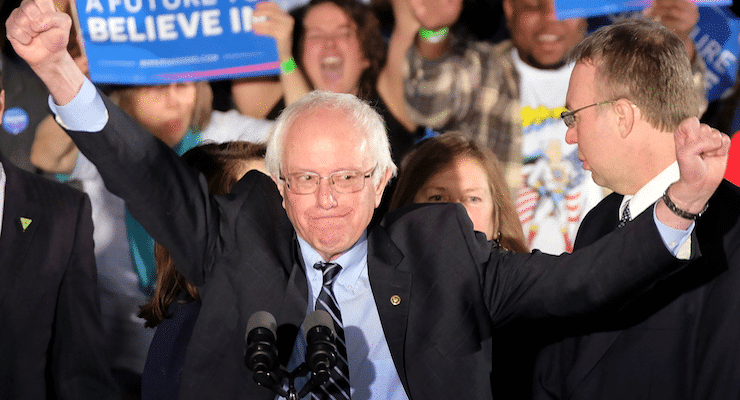

Vermont socialist Sen. Bernie Sanders gives his victory speech in New Hampshire on Feb. 9, 2016. Photo: AP/J. David Ake)
Bernie Sanders started his campaign stumping for his ideals without savaging the likely Democratic nominee, Hillary Clinton. That was an attractive combination.
Now that he’s done a lot better than anticipated (though way down in delegates), his people are wondering whether he has made a mistake by not lunging for Clinton’s throat.
The answer is no. He’d be even further down, because virtuous politicking has been the source of his charm.
Sanders has never been much of a team player. He is an independent, not a Democrat, but Team Democrat has respected his candidacy. And it has given him a platform he’d never have gotten on his own.
But the welcome mat shows holes. The impressive sums Sanders raises go to his campaign only. Clinton raises money for her campaign and for other Democrats down the ticket. Adding to an unpleasantness, the Sanders camp lashes out at Clinton’s fundraising as somehow sordid.
Exactly how are you going to get your liberal priorities passed without a friendlier House and Senate?
Not Sanders’ problem. Never has been. And that accounts for his modest accomplishments in Washington.
The Sanders campaign prides itself in speaking “the truth,” so here’s some:
Sanders did not fight alone for single-payer health care. He failed to attract a single co-sponsor for his recent single-payer bill, his fans explain, because the health care industry intimidated lesser liberals in the Senate.
But John Conyers proposed single-payer in the House and gathered more than 90 co-sponsors. (Conyers endorsed Clinton in the Michigan primary.)
Sanders recently accused Clinton of taking “significant money from the fossil fuel industry” — a claim for which The Washington Post awarded him three “Pinocchios.”
Oil and gas doesn’t even make the list of the top 20 industries contributing to the Clinton campaign. Fossil fuel money accounts for only 0.15 percent of her campaign and outside PAC sum. But Sanders gooses the numbers by dishonestly labeling donations from lobbyists who also work for other industries as fossil fuel money.
Sanders portrays himself as a one-man army fighting Wall Street abuses in the Senate. Actually, the one-man army has been one woman, named Elizabeth Warren.
Before joining the Senate, Warren championed the Consumer Financial Protection Bureau — detested by predatory lenders for shielding the little guys. Clinton was among the bureau’s most enthusiastic boosters and pushed other Democrats to sign on.
Sanders would have certainly won the financial industry’s enmity if it took him seriously. The Wall Street Journal’s editorial page virtually ignores him, turning its wrath on the far more dangerous Warren.
Now, Clinton’s $225,000-per-speech fees from Goldman Sachs are fair game for the political opposition. But then the opposition has to show what Wall Street got in return other than her insights and her company.
A quid pro quo is hard to pin down. For example, the head of the D.E. Shaw group has given more than $800,000 to the Clinton effort. His company holds much distressed Puerto Rican debt and opposes letting the island file for bankruptcy. Clinton is for it.
Do note that the financial services industry is among New York state’s largest employers and is No. 1 for payroll. Clinton represented the state, and senators do confer with large hometown employers.
Speaking of which, Sanders waves his fist against wasteful military spending but voted to fund the $1.2 trillion F-35 fighter — one of the most expensive, most cost-overrun and most plagued weapons systems in U.S. history. Seems the maker, Lockheed Martin, employs a bunch of Vermonters.
Sanders looks best when he conducts politics from the high road. He’d do well to stay there for the sake of his legacy.






